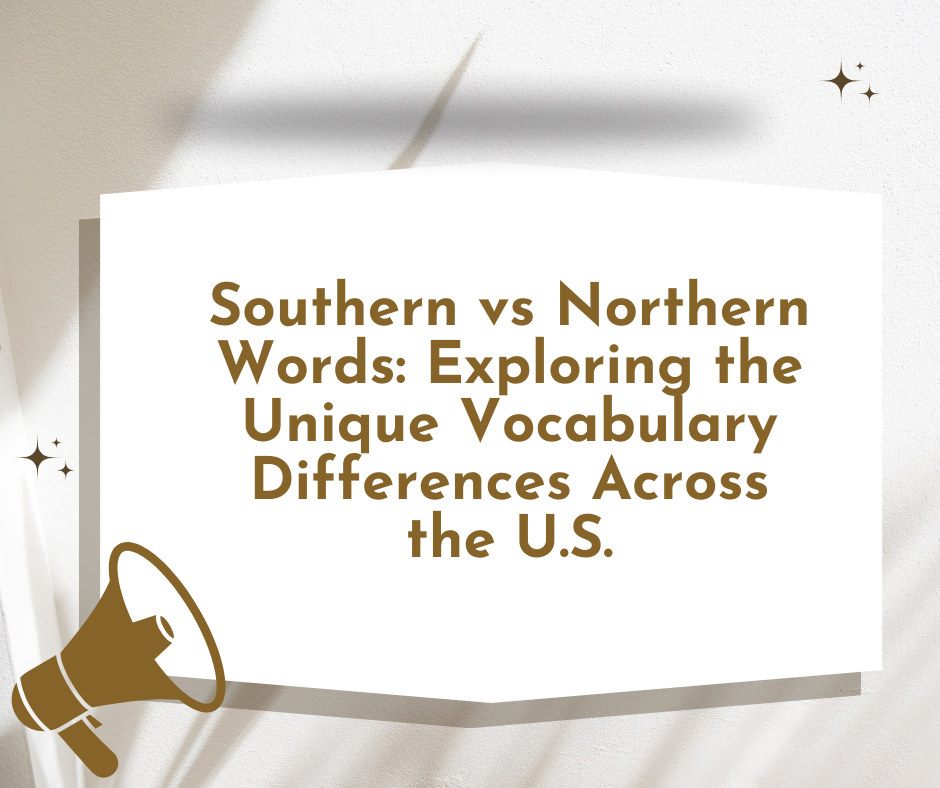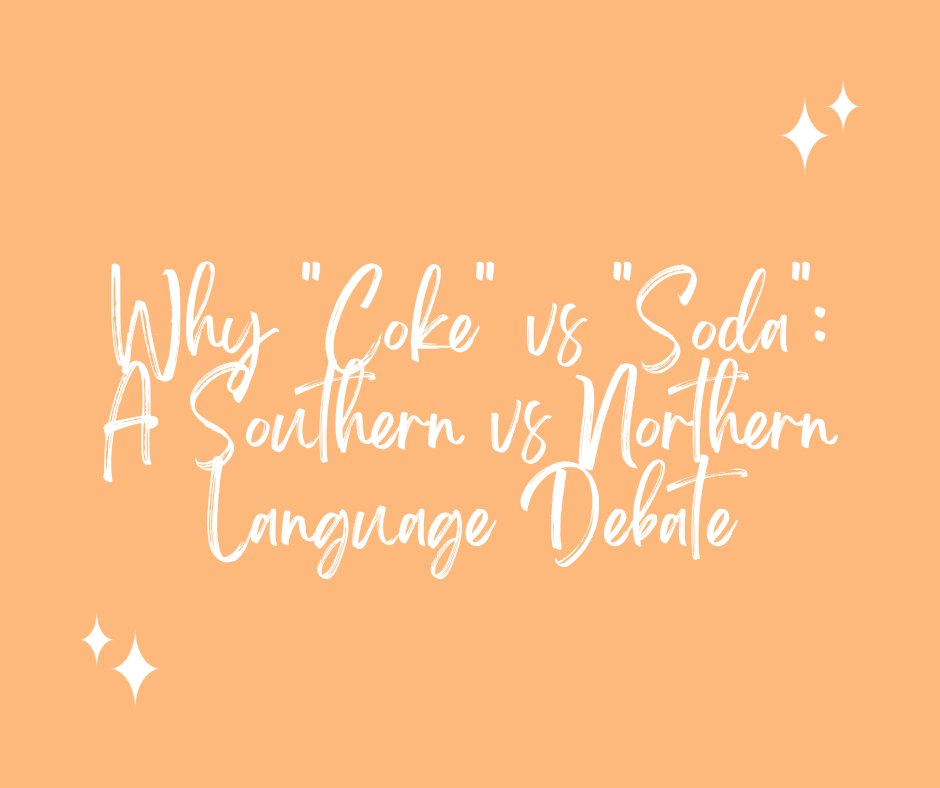
The United States is a vast country, rich in regional diversity, and this is reflected in its language. From the bustling streets of New York to the laid-back charm of New Orleans, the way people speak varies significantly across the nation. While the differences in accent are often the most noticeable, the vocabulary—specifically the words used in everyday conversation—can be just as distinct. The debate between Southern vs Northern words has long been a fascinating topic, with each region having its own set of expressions, slang, and colloquialisms.
For those who have traveled across the U.S. or have been exposed to different dialects, the contrasts can be striking. Whether it’s the term “soda” in the North versus “pop” in the South or the way directions are given, the words we use often reveal much more than just regional identity—they reflect cultural values, historical influences, and even weather patterns.
In this post, we will explore some of the most notable differences between Southern and Northern words, shedding light on how geography, history, and lifestyle have shaped language. Whether you’re a language enthusiast or simply curious about how different regions of the U.S. communicate, this guide will offer a fascinating look into the vocabulary that separates the North from the South.
Southern vs Northern Words: How Regional Vocabulary Shapes Identity

The words we use are deeply tied to where we come from, shaping not only how we communicate but also how we connect with the people around us. The divide between Southern and Northern vocabulary is more than just a matter of accent—it’s a reflection of the rich cultural, historical, and social differences that have evolved over time. Southern words often carry the weight of generations, influenced by the region’s history, climate, and way of life. The North, with its urbanized and industrial roots, has a language shaped by different waves of immigration, technological progress, and urbanization. Understanding the vocabulary differences between these regions helps us see how language is a living, breathing part of regional identity, expressing everything from attitudes and values to historical experiences.
Exploring the Southern Dialect: Common Words and Phrases The Southern dialect is rich in history, and its vocabulary is infused with charm, hospitality, and a strong connection to the past. Many Southern words and phrases reflect the slower pace of life in the region and its strong sense of community. Expressions like “y’all” for you all, “bless your heart” for expressing sympathy, and “fixin’ to” for indicating an intention to do something, all carry unique meanings that are hard to translate outside the South. The Southern dialect, with its distinct cadence, uses words that often evoke warmth, kindness, and a personal connection, making the vocabulary an integral part of the region’s culture. Southern vocabulary often thrives in family settings, community gatherings, and everyday conversation, creating an intimacy that makes it feel like home to those who use it.
Northern Vocabulary: Understanding the Unique Terms of the North The North, with its bustling cities and diverse population, has a vocabulary that reflects its fast-paced lifestyle and historical development. Words in Northern speech are often more straightforward and influenced by industrialization, immigration, and urban environments. For example, Northern residents might use “soda” instead of “pop” and refer to a car’s “trunk” instead of a “boot.” Northern vocabulary tends to be more standardized compared to the South, but it is also enriched by various cultural influences, particularly from European languages due to high immigration in the 19th and 20th centuries. This region’s vocabulary reflects the practicality and efficiency that characterize much of Northern life, often reflecting an emphasis on clarity and directness in communication.
The Evolution of Southern Words: From History to Modern Use Southern words have evolved over centuries, shaped by various cultural influences, including Native American, African, British, and French. Many of these words have been passed down through generations, maintaining their original meanings while also adapting to modern use. In the past, Southern speech was heavily influenced by agrarian life, with terms like “plow” and “cotton” becoming part of the everyday vocabulary. Over time, however, these terms began to blend with modern slang and expressions, creating a hybrid vocabulary that is unique to the region. Some Southern words, like “holler” or “gully,” reflect the rural, often isolated landscapes of the region. Today, Southern vocabulary has continued to evolve, embracing newer slang while maintaining its roots in traditional language.
Northern Slang: What Makes It Different from the South? Northern slang is often shaped by the urban environment and the fast-paced, no-nonsense attitude that accompanies it. It tends to be more succinct and utilitarian than its Southern counterpart. Northern expressions like “bodega” for a small convenience store or “grinder” for a sandwich reflect the region’s practical and functional approach to language. The vocabulary also includes terms influenced by the region’s immigrant populations, with words borrowed from Italian, Polish, and Yiddish, among others. Unlike the Southern dialect, which carries a slower, more drawn-out rhythm, Northern slang tends to be quicker and more efficient. This reflects the region’s culture of speed and hustle, with a focus on getting things done and moving forward.
Why “Coke” vs “Soda”: A Southern vs Northern Language Debate

One of the most famous and debated vocabulary differences between the North and South is the use of “Coke” versus “soda.” In the South, “Coke” is often used as a catch-all term for any type of soft drink, even if it’s not a Coca-Cola brand. This reflects the region’s long-standing relationship with the Coca-Cola company, which originated in Georgia. In the North, however, the more generic term “soda” is commonly used. This simple difference highlights the way regional culture and history shape the way we talk. For Southerners, calling all sodas “Coke” is an ingrained part of their culture, while Northerners may see it as odd or confusing. It’s a small example, but it illustrates how language evolves to reflect local customs and habits.
Regional Rhythms: How Southern and Northern Words Reflect Culture The rhythm of a region’s speech is often as distinctive as the words themselves. In the South, speech tends to be slower, with a melodic cadence that stretches vowels and draws out syllables. This slower pace of conversation reflects the relaxed lifestyle and the emphasis on social interaction and community in Southern culture. In contrast, Northern speech tends to be faster, with more clipped vowels and a more direct tone. This reflects the hustle and bustle of urban life and the region’s emphasis on efficiency. The vocabulary in each region mirrors these rhythms, with the South favoring longer, more descriptive words and the North opting for quicker, more straightforward terms.
From “Y’all” to “You Guys”: The Distinctive Phrases of the South and North One of the most iconic phrases in Southern speech is “y’all,” a contraction of “you all.” It’s used as a plural form of “you,” and its widespread use is one of the most recognizable features of Southern speech. In contrast, people from the North are more likely to say “you guys” or simply “you” for both singular and plural forms. This difference in phrasing isn’t just a quirk of speech—it represents a deeper cultural divide between the two regions. “Y’all” evokes a sense of inclusivity and community, as it’s often used to address a group in a more personal and friendly manner. Meanwhile, “you guys” in the North reflects a more individualistic approach to language, focusing on a more straightforward and less formal tone.
Is It “Pop” or “Soda”? The Regional Preferences for Carbonated Drinks The “pop” versus “soda” debate is another classic example of how regional vocabulary reflects local customs and influences. In the South, the term “Coke” often serves as a blanket term for any carbonated beverage, but “soda” is also commonly used in some parts. In contrast, the North firmly uses “soda” for these fizzy drinks. The origin of this difference can be traced back to regional preferences, with the North being home to large soda-producing companies and the South closely linked to Coca-Cola. The word “pop” is often associated with the Midwest, where it is used in place of both “soda” and “Coke.” These regional variations are not just linguistic but also cultural, reflecting different histories and traditions surrounding the soft drink industry.
Language and Geography: Why Certain Words Are Unique to the North and South Geography plays a significant role in the evolution of language, and the North and South are no exception. The way people speak in these regions is influenced by climate, history, migration patterns, and even the landscape. In the South, words like “holler” (a small valley) or “creek” (a stream) reflect the rural, natural environment that has shaped much of Southern life. The North, on the other hand, is home to larger urban areas, which often have their own linguistic quirks. For example, Northerners may use “the subway” to refer to underground transportation, while Southerners might call it a “metro” or “train.” These geographic distinctions show how words evolve based on the surrounding environment and the way people interact with it.
Understanding the South’s Love for “Fixin’ To” and Other Regional Expressions In the South, the phrase “fixin’ to” is a staple of everyday conversation. It’s used to indicate an intention to do something, often in the near future. For example, “I’m fixin’ to go to the store” means that the speaker is about to go to the store. This phrase, which might sound unusual to people from other parts of the country, is a prime example of Southern speech that reflects the region’s laid-back lifestyle. Other Southern expressions, like “bless your heart” or “ain’t,” further illustrate the region’s love for colloquial and colorful language. These phrases often convey emotions, sympathy, or warmth, making them an essential part of Southern culture and communication.
The Northern Way of Saying Things: Regional Words That Stand Out Northern speech is known for its directness and efficiency, and this is reflected in its vocabulary. Northerners tend to favor shorter, more straightforward words that convey information quickly and clearly. For instance, in the North, a large sandwich might be called a “grinder,” while Southerners might refer to it as a “sub” or “hoagie.” The North’s vocabulary is also influenced by its urbanization, with terms like “bodega” (a small grocery store) and “pizzeria” (a pizza shop) becoming common in everyday language. Northern vocabulary is typically more standardized, reflecting the region’s more homogeneous population and its focus on practicality.
How Weather Shapes the Vocabulary: Northern vs Southern Terms Weather plays a big role in shaping the vocabulary of different regions. In the South, words related to warmth and the outdoors are often used in everyday conversation, reflecting the region’s mild climate. For example,
Southerners might refer to a warm breeze as a “gale,” while Northerners might use terms like “windchill” or “snowdrift” to describe colder weather. In the North, where winters are harsher, vocabulary related to snow, ice, and winter storms is much more prominent. This regional variation in weather-related vocabulary showcases how climate affects not just the way people live but also the language they use to describe their surroundings.
Cultural Influences on Southern and Northern Vocabulary: How History Shapes Language

Cultural history plays a significant role in shaping regional dialects, and the vocabulary differences between the South and North reflect the distinct histories of each region. The South’s language is deeply influenced by its agricultural roots and its relationship with slavery, segregation, and the Civil War. Phrases like “bless your heart” or “ain’t” carry emotional weight, often tied to Southern hospitality and the region’s complex social dynamics. Meanwhile, Northern vocabulary is shaped by waves of immigration, industrialization, and urbanization. Many Northern terms, like “bodega” or “pizza,” have European origins due to the region’s large immigrant population in the early 20th century. These historical factors contribute to the distinct vocabulary in both regions, highlighting how language serves as a living record of a place’s past.
Northern vs Southern Food Vocabulary: A Tasty Way to Understand Regional Differences Food terminology is one of the most tangible ways to see the divide between Northern and Southern vocabulary. The South has its own set of culinary words that reflect its rich traditions and deep roots in comfort food. Words like “grits,” “biscuits,” and “collard greens” evoke a sense of home-cooked meals and gatherings around the dinner table. On the other hand, Northern food vocabulary is influenced by the region’s more diverse immigrant population, with terms like “bagels,” “pizza,” and “hoagies” standing out. Additionally, in the North, you’ll hear people refer to a “doughnut” instead of a “fried pie,” a popular Southern treat. These food-related vocabulary differences reflect the distinct culinary traditions in each region and the way those traditions shape daily life.
How Education Affects the Use of Southern and Northern Words Education systems in the South and North have historically been different, and these differences have impacted the vocabulary spoken by the people in these regions. In the North, schools typically emphasized standardized English, which led to the more uniform use of language across the region. As a result, Northern vocabulary tends to follow more universally accepted norms, making it easier to understand outside the region. In the South, however, the education system was often less centralized and has maintained a stronger tradition of regional vernacular. The Southern way of speaking is often seen as more expressive and informal, relying on colloquial words that can be confusing to outsiders. Despite this, both regions hold their vocabulary with pride, and many Southern words are now embraced for their charm and character.
How Technology Has Changed Southern and Northern Vocabulary With the advent of the internet and social media, language has become more unified, especially among younger generations. Yet, Southern and Northern vocabularies have not lost their regional identities. The North and South may use the same tech-related terms, like “smartphone” or “Wi-Fi,” but there are still regional variations that persist. For instance, while both regions might use the term “stream” for online video services, the South has a history of using words like “stream” to describe a natural waterway. These subtle differences show how technology has influenced modern vocabulary while still preserving certain regional expressions. The evolution of language through technology has introduced new slang, but regional words still carry significance in both Northern and Southern dialects.
Southern Hospitality in Language: How Words Reflect a Warm Culture One of the hallmarks of Southern culture is its emphasis on hospitality, and this is evident in the way Southerners use language. Words and phrases like “y’all,” “bless your heart,” and “come on in” reflect a deep-seated tradition of warmth and kindness. In the South, even the vocabulary is designed to make others feel comfortable, respected, and valued. The Southern tradition of hospitality extends to language, where the tone is often friendly and accommodating. These expressions are deeply ingrained in everyday conversation, making Southern vocabulary one of the most welcoming and approachable dialects in the country. The way Southerners speak isn’t just about the words—they convey a sense of community and belonging.
Northern Efficiency: How the Region’s Vocabulary Reflects Its Pragmatic Culture The North is often characterized by its fast-paced, pragmatic approach to life, and this is reflected in the region’s vocabulary. Northern language tends to favor directness and clarity, with words designed to convey information quickly and efficiently. Phrases like “grab a coffee” or “take the subway” are examples of how Northern speech is often geared toward getting things done in a practical and timely manner. The North’s vocabulary is shaped by urban environments, where speed and efficiency are essential. Northerners value brevity, and their language reflects this—there’s less of the extra flair and descriptive language found in Southern speech, making Northern vocabulary feel more streamlined and straightforward.
From “Jambalaya” to “Clam Chowder”: Regional Food Terms That Divide North and South Food has always been a significant cultural marker, and the South and North each have their own unique dishes that come with their own distinct vocabulary. In the South, words like “jambalaya,” “boudin,” and “po’ boy” evoke the flavors and traditions of Creole and Cajun cuisine, deeply tied to the region’s history and geography. In the North, dishes like “clam chowder,” “lobster roll,” and “New York-style pizza” dominate the food scene. The names of these foods reflect not just regional tastes but also the cultural influences of the areas. The South’s French, African, and Native American roots are evident in their food terminology, while the North’s European heritage is reflected in its cuisine and vocabulary. These food-related terms are another window into understanding the regional differences in language and culture.
How Travel Has Impacted Southern and Northern Words As people have moved across the country, there has been a blending of Southern and Northern words, though the regional distinctions remain strong. Travel has allowed people from the South and North to interact more frequently, sharing vocabulary and expressions. However, even with the spread of mass media and the mobility of populations, many Southern and Northern words remain distinct. Southerners traveling North may be asked about the meaning of “y’all,” while Northerners traveling South might get funny looks when they say “soda” instead of “Coke.” This exchange of vocabulary often leads to a greater appreciation of regional speech but also highlights the deep-rooted nature of regional dialects. Language is often an expression of place, and even as people move, the words they use carry traces of where they came from.
Regional Stereotypes: How Southern and Northern Words Fuel Misconceptions Regional differences in vocabulary can sometimes lead to stereotypes and misconceptions about people from different parts of the country. For example, Southerners are often stereotyped as slow-talking, overly polite, and excessively warm, due in part to their unique vocabulary. Phrases like “y’all” and “bless your heart” can be misinterpreted by people from other regions as overly familiar or insincere. On the other hand, Northern vocabulary can give the impression that Northerners are blunt, cold, or unfriendly, due to their straightforward manner of speaking. These regional stereotypes, while not entirely accurate, are influenced by the language and words used in each region. In reality, both Northern and Southern people use their vocabulary to express cultural values and to connect with others in meaningful ways.
The Role of Family and Community in Shaping Southern vs Northern Words Family and community play a central role in the language people use, and the vocabulary differences between the South and North are often passed down through generations. In the South, family and community gatherings are key to preserving regional language, with expressions and words being passed from grandparents to grandchildren. The Southern focus on close-knit families means that regional expressions are often learned in an intimate, personal context. In contrast, Northern vocabulary is shaped by the region’s larger cities and more diverse communities. People in the North are more likely to encounter a wide variety of linguistic influences, which results in a vocabulary that is more standardized but still rich in its own regional flavor. Both regions rely on family and community to perpetuate their language, with each group contributing to the way words and phrases evolve.
The Influence of Popular Culture on Southern and Northern Language Popular culture, including movies, television shows, and music, has helped shape the vocabulary of both the South and the North. Southern accents and phrases are often romanticized in Hollywood films, making words like “y’all” or “fixin’ to” more familiar to a national audience. Meanwhile, Northern phrases and vocabulary, especially those associated with New York and Boston, are frequently featured in films and TV shows, reinforcing the perception of the North as fast-paced and urban. Music also plays a major role in language. Country and blues music have kept Southern vocabulary alive, while Northern cities have influenced language through urban music genres like hip-hop. The exposure of both Southern and Northern dialects through popular culture has helped preserve these distinct vocabularies, ensuring their survival even as they continue to evolve.
Southern vs Northern Vocabulary in the Workplace: How Regional Differences Affect Communication In the workplace, regional vocabulary differences can lead to misunderstandings or even give insight into the person’s background and communication style. In Southern workplaces, language is often more informal and friendly, with a tendency to use expressions like “y’all” and “bless your heart” to convey warmth and empathy. In contrast, Northern workplaces tend to favor more direct communication, where clarity and efficiency are prioritized. This difference in language reflects the cultural values of each region—Southern workplaces emphasize relationships and personal connections, while Northern workplaces focus on results and efficiency. Understanding these differences in workplace communication can help foster better collaboration and respect between people from the South and North.
The Role of Dialects in the Evolution of Southern and Northern Vocabulary Dialects are an integral part of language evolution, and the dialects spoken in the South and North have evolved over centuries, influenced by migration patterns, historical events, and cultural shifts. The Southern dialect, for example, has roots in British English, but over time, it absorbed elements from African languages, French, and Native American dialects, creating a rich vocabulary that reflects the region’s diverse history. Northern dialects, on the other hand, were shaped by a mix of European languages, particularly German, Irish, and Italian, due to waves of immigration in the 19th and 20th centuries. These influences are seen in terms like “apartment” in the North versus “flat” in the South, or “soda” versus “pop.” As time has gone on, these regional dialects have continued to evolve, incorporating new words and expressions while retaining their distinctive characteristics.
How Education and Media Shape the Perception of Southern vs Northern Words Education and media play significant roles in shaping how we perceive regional dialects. In the past, many Southern dialects were viewed with prejudice, often labeled as “uneducated” or “backward,” while Northern speech, particularly that from large cities like New York or Boston, was seen as more authoritative and cosmopolitan. However, in recent years, the rise of social media and a more inclusive approach to education have helped challenge these stereotypes. Television shows, podcasts, and even viral videos have given people from both the South and North a platform to showcase the beauty and richness of their regional vocabularies. As a result, there’s been a growing appreciation for the diversity of language and a recognition that regional expressions carry cultural significance rather than reflecting intelligence or sophistication.
The Linguistic Tension Between Tradition and Modernity in Southern and Northern Words As society evolves, so does language, and the vocabulary of both the South and North is under constant pressure to adapt to modern trends. Younger generations, particularly in urban areas, are blending Southern and Northern vocabularies, incorporating slang and terms popularized by social media, hip-hop, and the internet. This can sometimes create tension, as older generations may resist these changes, preferring to hold on to the traditional words and expressions that have been passed down through the years. For example, in the South, older individuals may still use expressions like “y’all” and “fixin’ to,” while younger Southerners might substitute “you guys” or “gonna.” Similarly, Northern vocabulary is being influenced by global trends, with words from other languages and cultures becoming part of everyday speech. This linguistic tension reflects the ongoing battle between preserving tradition and embracing the influence of modernity on language.
Impact of Southern and Northern Vocabulary on Social Identity Vocabulary plays a crucial role in shaping social identity, and the words we use can tell a lot about our regional background and even our values. In the South, language is often tied to notions of hospitality, tradition, and warmth, with Southerners taking great pride in expressions that reflect a sense of community and belonging. Words like “y’all,” “sugar,” and “darlin’” evoke a deep connection to Southern identity and lifestyle. In contrast, Northern vocabulary is often associated with a more fast-paced, no-nonsense attitude. Phrases like “get in line” or “move quickly” highlight the Northern emphasis on efficiency and directness. These regional words can act as a social marker, signaling to others where someone is from and what social group they belong to. In many ways, vocabulary becomes a way of maintaining and asserting regional pride and identity, even in a society that is increasingly connected through technology and migration.
The Influence of Southern and Northern Dialects on American English Southern and Northern dialects have had a profound influence on American English as a whole, with words and expressions from both regions having made their way into mainstream language. Southern terms like “coke” (for soda), “y’all,” and “fixin’ to” are widely recognized, even outside the South. Similarly, Northern words like “bodega” (for a small convenience store) and “sub” (for a sandwich) have found their way into common use, especially in urban areas across the country. This cross-pollination of vocabulary is an example of how regional dialects contribute to the overall richness and diversity of American English. While regional dialects remain distinct, they have helped shape a more unified, national language by introducing new words and expressions to different parts of the country.
Social Media’s Role in Bridging Southern and Northern Vocabulary Social media has become a powerful tool for bridging the gap between Southern and Northern vocabulary, as platforms like Twitter, Instagram, and TikTok allow people from all over the country to share and celebrate their regional expressions. Memes, viral challenges, and trends often incorporate both Southern and Northern slang, creating a hybrid language that appeals to young people from both regions. For example, a viral video might feature a Northern speaker using the word “wicked” (meaning cool or awesome), while a Southerner may respond with “bless your heart,” and both terms are understood and appreciated by viewers across the country. This growing exposure to diverse linguistic expressions helps break down regional barriers and encourages people to see the beauty in different ways of speaking, ultimately leading to a more inclusive view of regional dialects.
The Role of Southern and Northern Words in Storytelling Storytelling is a rich tradition in both the South and North, and regional vocabulary plays a central role in bringing these stories to life. In the South, storytelling often revolves around oral history and personal anecdotes, with unique vocabulary that helps set the tone for the story. Words like “ain’t” or “holler” add a sense of authenticity and familiarity to Southern narratives, making them feel grounded in the region’s traditions. In contrast, Northern storytelling, especially in urban settings, often uses a more direct, fast-paced vocabulary, with a focus on action and efficiency. These regional differences in storytelling language serve to highlight the unique experiences and cultural backgrounds of people from each region. Through their use of language, Southerners and Northerners alike share their histories, challenges, and triumphs in ways that are deeply tied to their regions.
Generational Differences in the Use of Southern vs Northern Words Generational differences in vocabulary usage highlight the ongoing evolution of Southern and Northern dialects. Younger generations, particularly those exposed to national media and online platforms, may be less likely to use traditional regional expressions and may adopt more neutral or mainstream vocabulary. For example, younger Southerners might use “you guys” instead of “y’all,” or they might say “soda” instead of “Coke.” Similarly, younger Northerners may embrace more slang or global expressions that are not native to their region. Older generations, on the other hand, are more likely to hold on to the traditional vocabulary that has been passed down through their families and communities. These generational differences underscore how language evolves over time, with each generation adding its own twist to regional dialects while still maintaining a connection to the past.
The Influence of Regional Vocabulary on Language Learning For individuals learning English as a second language, regional vocabulary differences can present challenges. Southern and Northern terms often reflect the diversity of American English, making it important for learners to familiarize themselves with the nuances of both regional dialects. A learner from the South, for example, might struggle to understand Northern terms like “sub” or “soda” if they are used to saying “po’ boy” or “Coke.” Conversely, a Northern learner might find Southern expressions like “y’all” or “fixin’ to” confusing at first. However, mastering both Southern and Northern vocabulary is a valuable skill for anyone trying to understand the full breadth of American English, as it helps learners navigate the many variations of the language and communicate effectively across regions.
The Evolution of Southern and Northern Words in Popular Culture The evolution of Southern and Northern words has played a pivotal role in shaping American popular culture. From films and TV shows to music and literature, regional vocabularies have been showcased, influencing both regional identity and national perception. In the South, the unique dialect has been immortalized in works like “Gone with the Wind” or “The Dukes of Hazzard,” where Southern expressions like “reckon” and “ain’t” are part of the charm. Similarly, Northern dialects are often highlighted in Hollywood productions like “Goodfellas” and “The Sopranos,” where characters use phrases such as “gabagool” or “marone.” These portrayals both reflect and shape the way the rest of the country understands regional differences. Over time, this exposure has led to a wider acceptance of these vocabularies, bringing Southern and Northern expressions into the mainstream. As pop culture continues to evolve, so too does the language, with new words and phrases being added to both Southern and Northern lexicons.
Southern and Northern Words: A Reflection of Regional Pride Language is a significant marker of regional pride, and both the South and North take great pride in their distinct vocabularies. For Southerners, words like “bless your heart” and “y’all” are more than just expressions—they are part of a larger cultural identity. These words evoke a sense of hospitality, friendliness, and tradition that defines the Southern way of life. Similarly, Northerners take pride in their own vocabulary, often reflecting a sense of efficiency and directness. Words like “bodega,” “stoop,” or “grinder” represent the diverse history of the North, with influences from Italian, Jewish, and Irish immigrant populations. The way people speak in both regions can signal a deep connection to their roots and community, with each dialect fostering a sense of belonging and local pride. As Americans move around the country, regional vocabularies help people identify their cultural backgrounds and create bonds based on shared language.
How Geography Affects the Southern and Northern Vocabulary Geography plays a significant role in shaping the vocabulary of the North and South. The South, with its expansive rural areas and slower pace of life, has given rise to a vocabulary that often reflects its agricultural roots and close-knit communities. Terms like “holler,” “dirt road,” and “y’all” reflect the Southern lifestyle, where personal connections and traditional values are paramount. In contrast, the North, particularly the northeastern urban centers, has a more industrial and fast-paced vocabulary. Terms like “the subway,” “storefront,” and “apartment” reveal the practical, city-focused mindset that dominates the region. Geography also influences slang, with Southern speech embracing more laid-back expressions, while the North often favors more direct or even abrasive terminology, reflecting the competitive nature of urban living. The geography of each region thus impacts the ways people speak and interact, giving rise to distinct linguistic identities that are closely tied to their environments.
Southern vs Northern Words: Shifting Dynamics in the Workforce In the workforce, the way we speak can influence perceptions of professionalism and competence. Southern and Northern words sometimes create tension in professional settings, with certain expressions viewed as less formal or more casual in one region compared to the other. For example, in the South, phrases like “y’all” or “fixin’ to” are often seen as part of a warm, personable communication style that fosters connection. In contrast, Northern workers may prefer more direct language that focuses on efficiency and brevity, such as saying “I’m going to” instead of “I’m fixin’ to.” These regional differences in communication styles can impact how people from different areas interact in a professional context. However, as the workforce becomes more diverse and interconnected, there is growing acceptance of various dialects, with more workplaces embracing the richness of regional vocabulary as a sign of cultural diversity.
Southern and Northern Words in Food and Cuisine Food is one of the most prominent areas where Southern and Northern vocabularies differ. From the names of dishes to the ingredients themselves, the way food is described often varies drastically between the two regions. For instance, in the South, the term “sweet tea” is universally understood, whereas, in the North, iced tea is commonly consumed without sugar. The South is known for its distinct comfort foods, like “biscuits and gravy,” “fried chicken,” and “grits,” which are often absent in Northern menus. In contrast, Northern cuisine is characterized by words like “sub” (for a sandwich), “pizza pie,” and “hoagie.” Additionally, the way food is prepared and served varies between the regions, with Southerners often using the term “fixins” to refer to the sides that accompany a meal, while Northerners may just say “sides.” This contrast in culinary language underscores the regional differences that go beyond food and into the cultural fabric of each area.
The Influence of Immigration on Southern and Northern Vocabulary Immigration has had a profound impact on the vocabulary of both the South and North, with each region incorporating words from the languages of the immigrants who settled there. In the North, particularly in urban areas like New York and Boston, the vocabulary has been heavily influenced by Italian, Jewish, Irish, and other European languages. Phrases like “spaghetti and meatballs,” “bodega,” and “sub” have become part of everyday language. In contrast, the South was shaped by different waves of immigration, including the influence of African, French, and Spanish languages. Southern words like “gumbo,” “jambalaya,” and “voodoo” reflect this cultural blend. Additionally, the African-American community in the South has contributed terms like “jive” and “soul,” which have found their way into mainstream American vocabulary. These regional differences in vocabulary highlight the diverse influences that have shaped the linguistic landscape of the United States.
Generational Shifts in Southern and Northern Vocabulary As language evolves, so do the words used by different generations. In both the South and the North, younger generations are increasingly adopting slang and expressions that transcend regional boundaries. Words like “lit,” “bae,” and “chill” are widely used across both regions, thanks to social media and pop culture. However, each generation also retains certain regional words that mark their identity. For example, older Southerners might still use traditional phrases like “bless your heart” or “fixin’ to,” while younger Southerners may lean toward more neutral or mainstream terms. Similarly, Northerners may still use regional expressions like “pop” (for soda) or “stoop,” but younger generations may prefer words like “soda” or “front porch.” These generational shifts illustrate how language changes over time, with older speakers holding on to regionalisms and younger speakers blending their local vocabulary with contemporary slang.
The Psychological Impact of Southern and Northern Words The way we speak can have a profound psychological impact, both on how we perceive ourselves and how others perceive us. Southern and Northern words are often associated with certain personality traits or behaviors. For instance, Southern words are often linked with warmth, friendliness, and hospitality. Words like “y’all” or “bless your heart” can make Southerners seem approachable and caring. In contrast, Northern words are sometimes associated with directness, assertiveness, and even brusqueness. For example, using terms like “bodega” or “apartment” can give Northerners the appearance of being practical or businesslike. These regional differences in perception influence how people from each region see themselves and how they are viewed by others. Language, therefore, not only serves as a tool for communication but also acts as a reflection of regional identity and social interaction.
The Future of Southern and Northern Vocabulary As the United States continues to evolve, the future of Southern and Northern vocabulary remains in flux. While some traditional words and expressions may fade over time, others will likely continue to thrive, adapting to modern needs. Social media, technology, and globalization are all contributing to a merging of regional dialects, creating a hybrid language that blends the best of both the South and the North. However, the cultural importance of regional vocabulary will likely remain, with Southerners and Northerners continuing to use distinctive words as a way of signaling identity and belonging. The future of Southern and Northern words will undoubtedly reflect ongoing changes in society, but the enduring power of regional vocabulary will continue to shape the American linguistic landscape for generations to come.
Conclusion
In summary, while both Northern and Southern cultures share a common national identity, they embody distinct characteristics that influence social interactions, linguistic expressions, and political affiliations. These differences not only enrich the cultural landscape but also underscore the complexities of regional identities within broader national narratives. Understanding these nuances fosters greater appreciation for the diverse fabric of society in both the United States and England.
- What are the main differences in pronunciation between Northern and Southern English? Northern English tends to have more precise vowel sounds and less vowel merging, while Southern English often features a drawl with elongated vowels and certain sounds merged, such as “pen” and “pin” being pronounced the same way.
- How does slang differ between Northern and Southern regions? Slang varies significantly, with Northerners using terms like “buzzin'” (excited) and “cob on” (annoyed), while Southerners might say “y’all” (you all) and “fixin'” (preparing to) to express similar sentiments.
- Are there cultural stereotypes associated with Northerners and Southerners? Yes, Northerners are often viewed as direct and practical, while Southerners are seen as friendly and hospitable, reflecting broader cultural attitudes in each region.
- What unique words do Northerners use that Southerners might not understand? Words like “scran” (food), “bairn” (child), and “mither” (to fuss) are commonly used in the North but may confuse those from the South.
- How do sports preferences differ between the North and South? The South is known for its passion for football (American football), while the North has a strong following for soccer (football) and ice hockey, reflecting regional interests in different sports.
- What is the significance of food culture in Northern vs. Southern regions? Southern cuisine is characterized by dishes like fried chicken and biscuits, emphasizing comfort food, whereas Northern cuisine often features hearty meals like meat pies and fish and chips.
- How do social interactions differ in the North compared to the South? Southerners typically engage in more personal conversations with an emphasis on manners, while Northerners may prioritize efficiency and directness in their interactions.
- What role does music play in distinguishing Northern and Southern cultures? Music styles vary, with Southern culture heavily influenced by country music and blues, while Northern regions often embrace rock, pop, and folk traditions.
- Are there any notable historical events that shaped the North-South divide? Yes, historical events such as the Civil War in the U.S. and industrialization in England have contributed to lasting cultural differences between these regions.
- How can understanding these regional differences enhance communication? Being aware of dialects, slang, and cultural nuances can improve interpersonal communication by fostering respect and reducing misunderstandings between individuals from different regions.






